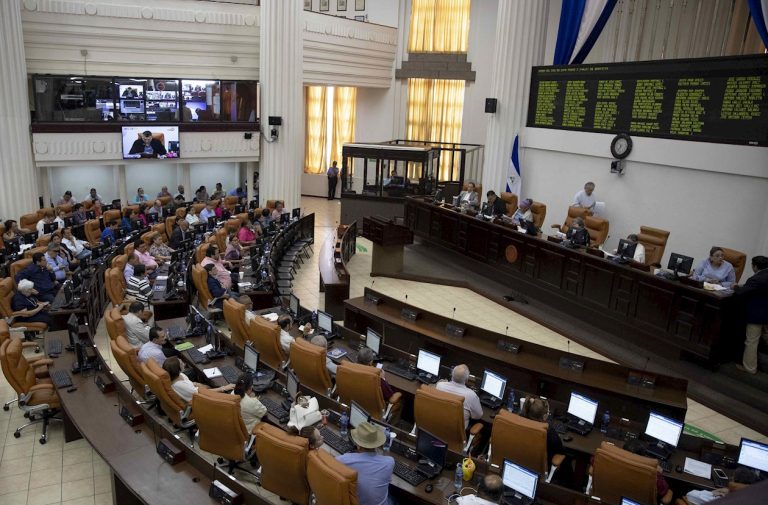20 de noviembre 2020

European Concern over Lack of Academic Freedom in Nicaragua

PUBLICIDAD 1M
PUBLICIDAD 4D
PUBLICIDAD 5D
The objective of the regime is to create a threat for opposition groups and to dilute the debate on the inexcusable electoral process at the same time

The real objective of regime is to create a threat for opposition groups and to dilute the debate on the inexcusable electoral process
On the explicit instruction of Daniel Ortega, this Tuesday, November 10, the National Assembly in Nicaragua approved the reform to article 37 of the Political Constitution to include exceptions to the recognition of 30 years as a maximum sentence, allowing the implementation of life imprisonment in the country.
This not only represents a sensitive regression in the matter of Human Rights and the establishment of a cruel and inhuman penalty, but the debate for its approval shows the annulment in the practice of separation of powers in the country. But beyond the tragicomedy of national politics, it is important to consider the relevance of this legal modification. Is the adoption of this measure useful?
Of course not, international experience has demonstrated that the punitive power of the state is more effective in reducing the incidence of crime when it is certain that a sanction will be applied in the event of the commission of a criminal act (reduction or cancellation in the gap of impunity), than the increase of the sentence in contexts with high levels of impunity. In other words, we are more afraid of the fine for not respecting the red traffic light, than of the increase in the cost of the fine to 5000 pesos for the same infraction on roads without police presence. What the regime has done is cheap criminal populism that actually reflects its inability to investigate crime in the country, of course, as the police and justice operators are focused on persecuting opponents rather than doing their job.
Now, how does the establishment of life imprisonment impact Human Rights? The first thing that can be said is that the operators of the regime do not understand, do not know, or are simply not interested in the interaction between international Human Rights Law and the Constitution. It is not about life imprisonment being allowed in the Constitution, but about its compatibility with the international commitments that the State has signed.
Article 46 of the Political Constitution creates what is known in Constitutional Law as the Constitutionality Block, that is, that the content of the international treaties referred to there is an integral part of the Political Constitution and article 10 of the International Covenant on Civil and Political Rights recognizes humane treatment for those deprived of liberty, as well as the right to social rehabilitation. This article is as constitutional as article 37, therefore, life imprisonment will continue to be unconstitutional.
On the other hand, people who have broken the law have the right to social rehabilitation or social reintegration and to receive comprehensive treatment that does not violate their dignity as a human being and provides them with tools for their effective incorporation into the community once they pay their debt to society. Among other things, it includes rehabilitation that involves psychosocial support to face addictions and other psychological problems that they may have; the right to access education; the right to job training. If a person has no legal possibility to regain his freedom his right to social reintegration as a person deprived of liberty loses total meaning, as a result turning the penalty into a discriminatory penalty which implies that not all persons deprived of liberty are equal.
Finally, it is considered a cruel and inhuman punishment, due to the anguish generated by the knowledge that there is no possible legal mechanism to obtain freedom, the hopelessness of the sentence, and the impossibility of even imagining life in freedom becomes singularly cruel. One of the greatest and most dignifying challenges that human beings can experience is to confront the consequences of their actions, assume them, and amend them as a way to redeem themselves. For this reason, life imprisonment, rather than lacerating human dignity, takes it away.
The sum of these elements makes up the creation of a constitutional antinomy. In any case, we will have to wait for the reform of the Penal Code to regulate its application, since claiming its direct application violates the most elementary forms of a State of Law, which I think is excessive even for the regime. Only then can legal mechanisms that seek to reverse this measure be articulated.
That said, we have to specify that the real objective of the regime is to create a threat to opposition groups and at the same time dilute the debate on the inexcusable upcoming electoral process. If there is talk of a “Muzzle Law” that does not have the material capacity to comply, a "Foreign Agents Law" that seeks to persecute Human Rights defenders and distract them from their work, and now the establishment of “Life Imprisonment”, at what point do we debate the elections? When do we agree to push for electoral reforms that lead to an authentic electoral process?
Through these actions, the regime intends to dilute the attention of public opinion on the inevitable fact that the regime must be deposed and that it must be deposed by electoral means. The electoral reform will simply add to this chain of barbarities, it is a desperate attempt to postpone the inevitable.
*Professor in Human Rights
This article has been translated by Ana Maria Sampson, a Communication Science student at the University of Amsterdam and member of our staff*
PUBLICIDAD 3M
Abogado nicaragüense, máster y consultor independiente en Derechos Humanos, radicado en México.
PUBLICIDAD 3D